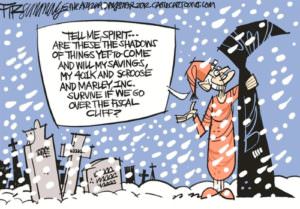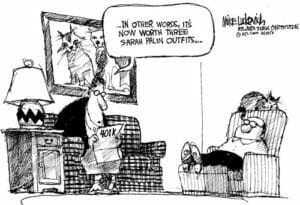The 401(k) Myth
Those who think they will retire in Fat City because they have a 401(k) may be headed for a bitter disappointment. The system's rules are flawed, and Washington should reform them.WASHINGTON — The great 401(k) bonanza may well turn out to be a bust for most workers. This is not news to millions who know their account balances, or to low-income workers whose employers rarely offer them the chance to open an account.
In the 1980s and, especially, the go-go 1990s, the 401(k) was the wondrous new invention that was supposed to make assembly-line workers capable of becoming rich, in retirement, through their own industriousness and, lest we forget, the magic of the stock market. The myth began to fade amid Wall Street’s uncertainty during the past decade. It should be buried — deeply — with the latest Government Accountability Office report on the savings plans that have become the primary form of pensions available to that half of the private work force that has any pension at all.
Projecting retirement savings based on those currently participating in 401(k)-style plans, the GAO found that the youngest workers — those who’ve been told from the start that their jobs would provide no traditional, fixed-benefit pensions of the sort that their grandparents or parents might rely on — face the prospect of paltry incomes in old age. More than a third of those born in 1990 could be predicted to have no savings at all in retirement, the GAO found. Among the lowest-income workers, 63 percent would have no savings in their plans when they retire.
What about more diligent savers? Overall, the GAO found that as a group these retirees would have an average income of about $18,784 a year, or just over $1,500 a month. Among the highest-income workers, a fund balance that is used exclusively for monthly income — not for extravagant extras — would be $50,098 a year.
“Some will have very little, some will have almost nothing, and some will have nothing when they retire,” says Rep. Robert Andrews, D-N.J., who chairs the House subcommittee on health, employment, labor and pensions.
Flaws in the very structure of 401(k) plans are at the root of why they don’t work well. No employer is required to offer a 401(k), let alone provide one for every worker. The GAO found that only a quarter of the lowest-income workers were offered any type of retirement plan. Among low-wage workers who could save through a 401(k), only 8 percent chose to participate. Making enrollment automatic, rather than optional, would particularly help those working for low wages, the report suggested.
Ending workers’ ability to cash out a 401(k) upon leaving a job, as about half now do, would also help. The failure of even higher-income people to roll over their retirement savings into another retirement account — “leakage,” as the report calls it — is one of the reasons account balances are relatively low at retirement age, even if a worker has earned a solid income. “Taking money out of these accounts, or failing to roll them over, is very expensive,” says Rep. George Miller, D-Calif., chairman of the House Committee on Education and Labor.
Of course, using 401(k) accounts as sort of a tax-preferred slush fund was part of their initial appeal. Rules allowing workers to cash out a retirement savings plan or to borrow from it were written into the program when it began. But that was when the savings plans were envisioned as supplements to traditional pensions that guaranteed monthly income in retirement, and not a substitute for them. “These are hangovers from another system,” Miller says.
The blinding headache has not yet settled upon us. That will come when millions of people — and not just baby boomers — retire to find that their promised pot of gold is close to empty. If current trends continue, even Social Security will be stretched and strained by a generation of retirees with no other means of support.
This is one reason why the repetitive and misleading political rhetoric on Social Security, the strongest and best-funded part of the nation’s retirement system, is so unprincipled. Traditional employer-provided pensions are an endangered species. The evolution to a self-funded retirement through 401(k) accounts has produced a mutant that doesn’t function well.
Democrats, including the party’s leading presidential candidates, have been arguing for years that the 401(k) must be remade if it is to be a pension, not a piggy bank. At the moment, they debate only among themselves. After decades of dropping just a few pennies into the slot, Americans deserve more than to be told to dig deeper for a few more coins.
Marie Cocco’s e-mail address is mariecocco(at)washpost.com.
© 2007, Washington Post Writers Group
Your support matters…Independent journalism is under threat and overshadowed by heavily funded mainstream media.
You can help level the playing field. Become a member.
Your tax-deductible contribution keeps us digging beneath the headlines to give you thought-provoking, investigative reporting and analysis that unearths what's really happening- without compromise.
Give today to support our courageous, independent journalists.




You need to be a supporter to comment.
There are currently no responses to this article.
Be the first to respond.